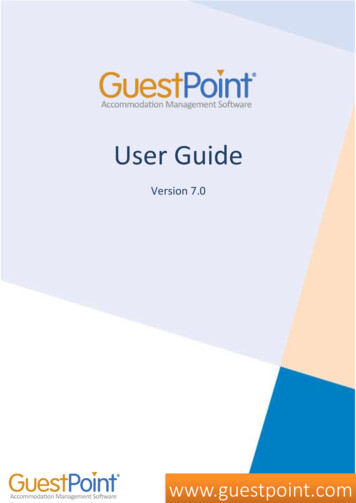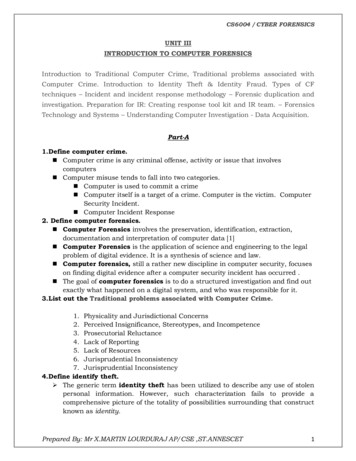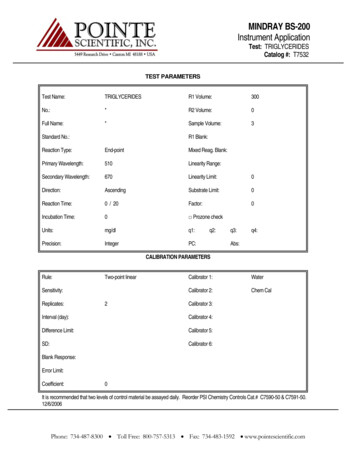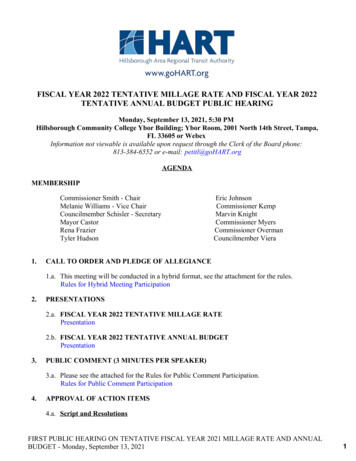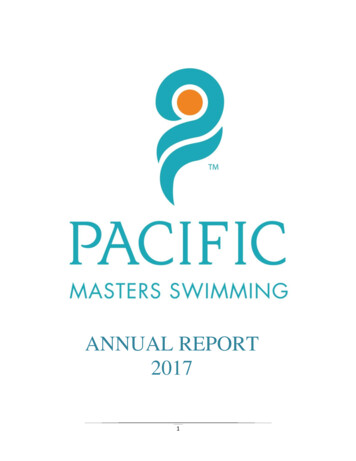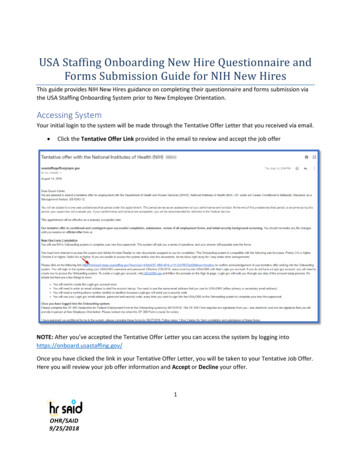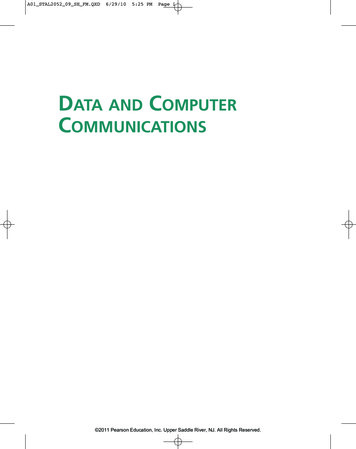
Transcription
CS 5313: Computer Networks (Tentative)Instructor: Dr. Deepak K. ToshSemester: Fall 2020Email: dktosh@utep.eduClass Hours: TR, 3:00 – 4:20PMOffice Hours: TR, 11–12AM/Appmt. (Zoom)Class Room: ONLINE – (Zoom)Course DescriptionThis course offers in-depth concepts of computer networks and with technical foundations of theInternet. Topics to cover include overview of network models, architectures, applications, networkprogramming interfaces (e.g. sockets), protocols and algorithms for routing and transport,congestion control, addressing, local area networks, medium access control, and network security.This course will cover various networking concepts as well as protocols and discuss on how theycohesively work together to provide unique Internet services, with emphasizing on1. Application, transport network, and link layers2. Layering benefits through top-down approach in TCP/IP and OSI stack3. Emergence of software-defined networking and its performance impactsCourse ObjectiveThe objective of this course is to provide deeper understanding of the generic principles,components, and design of modern computer networks with a focus to learn the workingmechanism of Internet.Course Outline (TENTATIVE)1.2.3.4.5.Course Overview and Intro (1.5 Weeks)a. What is the Internet?b. Edge and Corec. Performance, Protocol Layeringd. Protocol Layering, SecurityApplication Layer (2 Weeks)a. Principles of Network Applicationsb. The World Wide Web, HTTP, and Emailc. Email, DNSd. P2P, Video Streaming, CDNsTransport Layer (3.5 Weeks)a. Principles of Transport, UDPb. Reliable Data Transferc. TCP and Congestiond. TCP’s Congestion ControlNetwork Layer: Data Plane (1.5 Weeks)a. Overview and Addressingb. Dissecting a Routerc. Internet Protocol (IP)d. Generalized forwarding and SDNNetwork Layer: Control Plane (1.5 Weeks)
a. Routing Algorithmsb. Intra-AS routingc. Routing among ISPsd. SDN control planee. Network management (ICMP and SNMP)6. Link Layer and LANs (1.5 Weeks)a. Intro to Link Layer, Multiple Access Linksb. Error detection and correctionc. ARPd. LANs, Virtual networks/links7. Special Topics (0.5 Week)a. Information-Centric Networkingb. Network SecurityNote: We may cover advanced topics that are beyond the textbook. In that case, the instructor willupload the electronic copies of the handouts/weblinks in the Blackboard.You will also need regular access to a computer, stable/consistent Internet, Blackboard, and yourUTEP email account for succeeding in this class.Required Materials/Books"Computer Networking: A Top-Down Approach" by James F. Kurose andKeith W. Ross. (7th Edition)Course Assignments and Grading (Tentative):Your semester grade will be based on a weighted combination of homework assignments, quizzes,participation, and exam. The approximate percentages for each category are given in the followingand the final grade will be calculated using weighted average of these items.Grade Distribution 20% - Quizzes, and Participation (QP)35% - Homework and Lab Assignments (Assign)20% - Midterm Exam (Midterm)25% - Final Exam (Final)Total Score 0.2 (Avg. QP) 0.35 (Avg. Assign) 0.2 (Midterm) 0.25 (Final)Total ScoreGrade90-100A80-89B70-79C60-69D59 and BelowF** Students are required to agree to the UTEP College of Engineering’s Honor Code.
Important Note: You will have one week to appeal for your grades after the graded assignmentsand tests are returned. So, please keep this in mind if you think that there is a problem/issue withthe grading of your work.Late Submission Policy:-No extension on the assignment submission due dates will be given.Late submissions will be penalized with 10% deduction per day up to a maximum of 5days. Submission after 5 days of due date will receive 0 points.a. Homework AssignmentsThere will be 6 homework assignments, approximately two per month. Through these assignments,students will develop concrete understanding on various protocols at each layer of TCP/IP stack:application, transport, network, and data link layer. Some specific assignment will be required tobe done in group of 2. In this case, the instructor will create groups by picking students randomlyand each team must provide the list of individual contributions made in the assignment.Uniqueness and plagiarism will be strictly checked in the submitted reports. So, ensure youunderstand the assignment tasks well beforehand and please DO NOT PLAGIARIZE from othercolleagues or any external source. Any external materials referred to solve the assignment tasksmust be CITED in the reports.Note: Students/Teams may be asked to demonstrate their assignments and answer additionalfollow up questions, whenever the instructor needs to verify the originality of their works.b. Quizzes, and ParticipationThere will be weekly quizzes posted in BB every Saturday noon and will be available until sameday midnight. Students must allocate 10-15 minutes on every Saturday (between 12pm – 12am) toattempt the quizzes, which contributes 15% of total grade. And participating/attending in the zoomdiscussions would contribute additional 5% of total grade.c. Midterm and Final ExamMidterm exam is scheduled to be on 6th October 2020 and Final exam will be conducted on theday of UTEP’s allotted day, which is 10th December 2020. Each exam will be taken in blackboardand the estimated duration will be 80-100 minutes. The format of the exams will be furtherdiscussed in the class and announced later.Note: The tests will be open for 12 hours on the exam day and the students must take the test atone stretch. Attempt to retake the test would erase their previous attempt(s) and the question setwill be reinitialized.Course Outcomes:Knowledge and Comprehension1. Understand and describe the layered design of protocol model
2. Working mechanism of application layer protocols: http, email, ftp, etc.3. Understand the unreliable and reliable transport protocols along with various flow controland error control mechanisms4. Understand routing protocols, network filtration techniques, and network virtualization5. Learn the importance of network and data plane segregation in SDN6. Understand security implications of various protocols at each layerApplication and Analysis1. Compare performance of both reliable and unreliable transport protocols.2. Design addressing mechanism for predefined local area network3. Analyze and evaluate a number of datalink, network, and transport layer protocols4. Capture and process the live network traffic for deep packet analysisSynthesis and Evaluation1. Program network communication services for client/server and construct network filteringcomponents.2. Design and implement a reliable transport protocol using network programming interface(e.g. datagram sockets)3. Evaluate performance metrics of the implemented reliable transport protocolTechnology RequirementsClass will meet at the scheduled time in Zoom (link available in left panel of Blackboard). Thecourse content will be posted in the Blackboard learning management system. Therefore, pleaseensure to have stable Internet and a laptop with working microphone & webcam to connect withinstructor and accessing course materials. If you encounter technical difficulties beyond your scopeof troubleshooting, please contact the Help Desk as they are trained specifically in assisting withtechnological needs of students.Netiquette and Standards of ConductStudents are expected to conduct themselves in a professional and courteous manner, as prescribedby the Standards of Conduct. Students may discuss work assignments and programming exercisesin a general way with other students, but the solutions must be done independently. Similarly,groups may discuss group project assignments with other groups, but the solutions must be doneby the group itself. Graded work should be unmistakably your own. You may not transcribe orcopy a solution taken from another person, book, or other source, e.g., a web page. Professors arerequired to -- and will -- report academic dishonesty and any other violation of the Standards ofConduct to the Dean of Students. Some key points to remember:o Always consider audience. Remember that members of the class and the instructor will bereading all the postings.o Respect and courtesy must be provided to classmates and to instructor at all times. Noharassment or inappropriate postings will be tolerated.o When reacting to someone else’s message, address the ideas, not the person. Post only whatanyone would comfortably state in a F2F situation.o Blackboard is not a public Internet venue; all postings to it should be considered privateand confidential. Whatever is posted on in these online spaces is intended for classmatesand professor only. Please do not copy documents and paste them to a publicly accessible
website, blog, or other space. If students wish to do so, they have the ethical obligation tofirst request the permission of the writer(s).Academic Dishonesty and Code of HonorAcademic dishonesty is strictly prohibited and is considered a violation of the UTEP Handbookof Operating Procedures. It includes, but is not limited to, cheating, plagiarism, and collusion.Cheating may involve copying from or providing information to another student, possessingunauthorized materials during a test, or falsifying research data on laboratory reports. Plagiarismoccurs when someone intentionally or knowingly represents the words or ideas of another as ones'own. Collusion involves collaborating with another person to commit any academically dishonestact. Any act of academic dishonesty attempted by a UTEP student is unacceptable and will not betolerated. All suspected violations of academic integrity at The University of Texas at El Pasomust be reported to the Office of Student Conduct and Conflict Resolution (OSCCR) for possibledisciplinary action. To learn more HOOP: Student Conduct and Discipline.Note: Students are required to agree to the UTEP College of Engineering’s Honor Code.DisabilitiesUTEP is committed to providing reasonable accommodations and auxiliary services to students,staff, faculty, job applicants, applicants for admissions, and other beneficiaries of Universityprograms, services and activities with documented disabilities in order to provide them with equalopportunities to participate in programs, services, and activities in compliance with sections 503and 504 of the Rehabilitation Act of 1973, as amended, and the Americans with Disabilities Act(ADA) of 1990 and the Americans with Disabilities Act Amendments Act (ADAAA) of 2008.Reasonable accommodations will be made unless it is determined that doing so would cause unduehardship on the University. Students requesting an accommodation based on a disability mustregister with the UTEP Center for Accommodations and Support Services.Student ResourcesUTEP provides a variety of student services and support: UTEP Library: Access a wide range of resources including online, full-text access tothousands of journals and eBooks plus reference service and librarian assistance forenrolled students.Help Desk: Students experiencing technological challenges (email, Blackboard, software,etc.) can submit a ticket to the UTEP Helpdesk for assistance. Contact the Helpdesk viaphone, email, chat, website, or in person if on campus.University Writing Center (UWC): Submit papers here for assistance with writing styleand formatting, ask a tutor for help and explore other writing resources.Math Tutoring Center (MaRCS): Ask a tutor for help and explore other available mathresources.Military Student Success Center: UTEP welcomes military-affiliated students to its degreeprograms, and the Military Student Success Center and its dedicated staff (many of whom
are veterans and students themselves) are here to help personnel in any branch of serviceto reach their educational goals.RefWorks: A bibliographic citation tool; check out the RefWorks tutorial and Fact Sheetand Quick-Start Guide.
c. Performance, Protocol Layering d. Protocol Layering, Security 2. Application Layer (2 Weeks) a. Principles of Network Applications b. The World Wide Web, HTTP, and Email c. Email, DNS d. P2P, Video Streaming, CDNs 3. Transport Layer (3.5 Weeks) a. Principles of Transport, UDP b. Reliable Data Transfer c. TCP and Congestion d.

